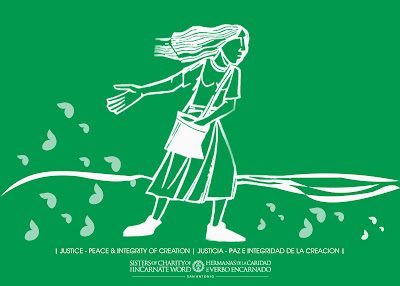¡Hoy es el Día Mundial de Oración por el Cuidado de la Creación! Oremos, eduquémonos, respondamos y celebremos juntas(os) este Tiempo de la Creación (del 1 de septiembre al 4 de octubre). La hermana Martha Ann nos comparte esta magnífica reflexión escrita por Barbara Brown Taylor. Sister Martha Ann dice: "piensa en nuestra imagen de JPIC, la mujer que arroja las semillas."
 |
| JPIC es por Justicia, Paz e Integridad de la Creación |
La generosidad del sembrador
La autora y predicadora Barbara Brown Taylor considera su respuesta habitual a la parábola del Sembrador que esparce la semilla en diferentes tipos de terreno. Pasaje del Evangelio de Mateo 18-23.
Empecé a preocuparme por el tipo de terreno que pisaba con Dios. Empecé a preocuparme por cuántos pájaros había en mi campo, cuántas piedras, cuántas espinas. Empecé a preocuparme por cómo podría limpiarlos todos, cómo podría convertirme en un campo bien labrado, bien desbrozado y bien abonado para la siembra de la palabra de Dios. Empecé a preocuparme de que las probabilidades eran tres a uno en mi contra -después de todo, esas son las probabilidades en la parábola- y empecé a pensar en cómo podría vencer las probabilidades... limpiando mis actos.
La autora y predicadora Barbara Brown Taylor considera su respuesta habitual a la parábola del Sembrador que esparce la semilla en diferentes tipos de terreno. Pasaje del Evangelio de Mateo 18-23.
Empecé a preocuparme por el tipo de terreno que pisaba con Dios. Empecé a preocuparme por cuántos pájaros había en mi campo, cuántas piedras, cuántas espinas. Empecé a preocuparme por cómo podría limpiarlos todos, cómo podría convertirme en un campo bien labrado, bien desbrozado y bien abonado para la siembra de la palabra de Dios. Empecé a preocuparme de que las probabilidades eran tres a uno en mi contra -después de todo, esas son las probabilidades en la parábola- y empecé a pensar en cómo podría vencer las probabilidades... limpiando mis actos.
Esa es mi respuesta habitual a esta parábola. La escucho como un reto a ser diferente, como una llamada a mejorar mi vida, de modo que si la misma parábola se contara sobre mí tendría un final más feliz, con toda la semilla cayendo en tierra rica y fértil. Pero hay algo que no cuadra en esa lectura de la parábola, porque si se trata de eso, debería llamarse la parábola de las diferentes clases de tierra.
Taylor se pregunta si nuestra interpretación familiar puede pasar por alto el mensaje más dramático de la gracia radical de Dios:
En cambio, durante siglos se ha conocido como la parábola del sembrador, lo que significa que existe la posibilidad, sólo la posibilidad, de que lo hayamos entendido todo al revés. Oímos la historia y pensamos que se trata de una historia sobre nosotras(os), pero ¿y si nos equivocamos? ¿Y si no se trata de nosotras(os), sino del sembrador? ¿Y si no se trata de nuestros éxitos y fracasos y de los pájaros y las piedras y las espinas, sino de la extravagancia de un sembrador que no parece inmutarse por esas preocupaciones, que arroja la semilla por todas partes, la desperdicia con santo abandono, que alimenta a los pájaros, silba a las piedras, que se abre paso entre las espinas, que grita aleluya a la buena tierra y que sigue sembrando, seguro de que hay suficiente semilla para todas(os), de que hay abundancia y de que, cuando llegue la cosecha, llenará todos los graneros del barrio hasta las trancas.
Si esta es realmente la parábola del Sembrador y no la parábola de las diferentes clases de tierra, entonces empieza a sonar bastante nueva. La atención no se centra en nosotras(os) y en nuestras carencias, sino en la generosidad de nuestro creador, el prolífico sembrador que no se obsesiona con el estado de los campos, que no es tacaño con la semilla, sino que la echa en todas partes, en la tierra buena y en la mala, que no es precavido ni crítico, ni siquiera muy práctico, sino que parece dispuesto a seguir metiendo la mano en su saco de semillas por toda la eternidad, cubriendo toda la creación con la fértil semilla de su verdad.
Barbara Brown Taylor, Las semillas del cielo: Sermons on the Gospel of Matthew (Louisville, KY: Westminster John Knox Press, 2004), 25-26.
